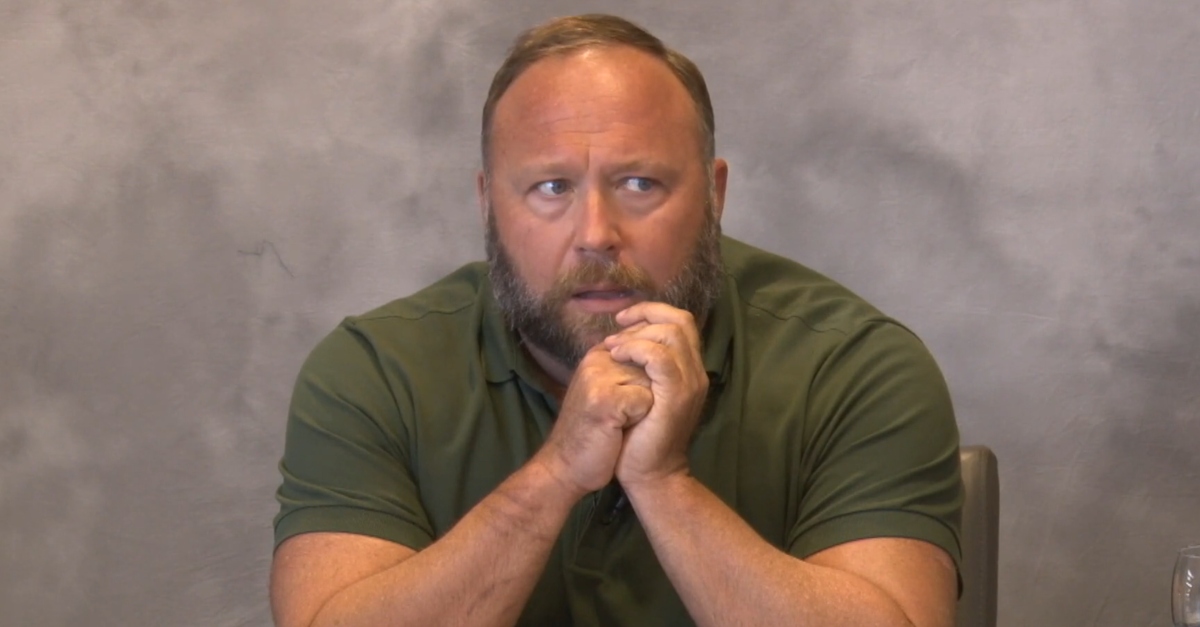
Conspiracy theorist and Infowars host Alex Jones on Tuesday filed court papers in an attempt to settle a series of longstanding defamation claims by the families of the victims of the 2012 Sandy Hook, Connecticut school massacre.
Within hours, each plaintiff rejected the offers by Jones and his attorneys to rubbish the case in return for cash payments.
The sixteen individual settlement offers — legally deemed to be “offers of compromise” under Connecticut law — each say Jones and several corporate defendants “hereby direct . . . to allow said plaintiff to settle for the sum of One-Hundred Twenty-Thousand Dollars and No Cents ($120,000.00).”
“Mr. Jones extends his heartfelt apology for any distress his remarks caused,” the terse documents state.
As is common with settlement offers, the documents do not directly admit liability.
The forms were executed and filed in multiples — with one each being to each one of the sixteen named plaintiffs: David Wheeler, Francine Wheeler, Jacqueline Barden, Mark Barden, Nicole Hockley, Ian Hockley, Jennifer Hensel, Donna Soto, Carlos M. Soto, Carlee Soto-Parisi, Jillian Soto, William Aldenberg, and Richard Coan in one case; William Sherlach in a second concomitant case; and William Sherlach and Robert Parker in a third companion case. All of the cases are being tried together.
The offers were signed electronically by attorney Norm Pattis, a high-profile Connecticut firebrand attorney who represents Jones.
“It’s time for the litigation to end,” Pattis wrote in an email to Law&Crime when asked to comment about the offers. “The shooting took place almost 10 years ago.”
Offers of Compromise are governed by Conn. Gen. Stats. § 52-193, which reads as follows:
In any action on contract, or seeking the recovery of money damages, whether or not other relief is sought, the defendant may, not later than thirty days before trial, file with the clerk of the court a written offer of compromise signed by the defendant or the defendant’s attorney, directed to the plaintiff or the plaintiff’s attorney, offering to settle the claim underlying the action for a sum certain.
A trial is scheduled to begin on May 3, 2022, according to online court dockets — just barely more than thirty days from the dates of the offers.
The settlement offers involve Alex Emric Jones individually and defendants Infowars, LLC; Free Speech Systems, LLC; Infowars Health, LLC; and Prison Planet TV, LLC.
The plaintiffs responded with their own individual retorts by Tuesday night — but they spoke in unison via the employment of the same exact verbiage.
“[P]laintiff Carlee Soto Parisi rejects in full the Jones Defendants’ offer of compromise filed on March 29, 2022,” the first such reply states. “The so-called offer is a transparent and desperate attempt by Alex Jones to escape a public reckoning under oath with his deceitful, profit-driven campaign against the plaintiffs and the memory of their loved ones lost at Sandy Hook.”
The declinations are all dated in the court docket as having been filed on Wed., March 30, though they were filed and made public on Tuesday evening. The reason for the discrepancy is because the replies were filed after standard and usual business hours.
Adam Lanza opened fire at the Sandy Hook Elementary School on Dec. 14, 2012, and killed 20 first-grade children and six adults, the plaintiffs’ 2018 lawsuit said in summary. The document called Jones “the most prolific among those fabricators” who “persistently perpetrated a monstrous, unspeakable lie: that the Sandy Hook shooting was staged, and that the families who lost loved ones that day are actors who faked their relatives’ deaths.”
The original lawsuit alleged five counts: invasion of privacy by false light (civil conspiracy), defamation and defamation per se (civil conspiracy), intentional infliction of emotional distress (civil conspiracy), negligent infliction of emotional distress (civil conspiracy), and violations of the Connecticut Unfair Trade Practices Act.
The offers by Jones came just days after the plaintiffs asked a judge to hold Jones in contempt for repeatedly failing to appear for a deposition. Jones said the planned sit-and-talk session in Texas was causing him “significant stress” and cited unspecified medical concerns for failing to appear.
The cases are numbers UWY-CV-18-6046436-S, UWY-CV-18-6046437-S, and UWY-CV-18-6046438-S in Connecticut’s Waterbury Judicial District.
Read an example of one of the offers of compromise below. Also includes below are just one of the myriad rejections.
[Editor’s note: This piece has been updated to include a reaction quote from Norm Pattis. It has been updated again to include the plaintiffs’ rejections of the offers.]
[image via video screengrab/Kaster Lynch Farrar & Ball LLP]